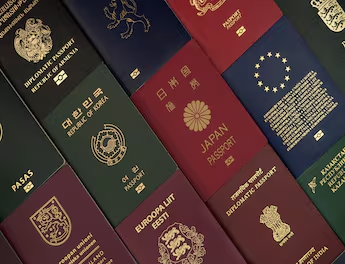Are you dreaming of jet-setting around the globe with just a passport in hand? While some passports open doors to a plethora of countries visa-free, others face restrictions that can make travel seem like navigating a maze. Join us as we explore the world of passports and uncover the top 3 powerhouses along with the 7 underdogs that grant access to fewer than 50 visa-free countries – welcome to the realm of passport power rankings!
What makes a passport powerful?
Passport power is not just about being a small booklet filled with stamps and visas. It represents the global influence and diplomatic relationships of the issuing country, impacting its citizens’ freedom to travel effortlessly across borders. A powerful passport signifies trustworthiness, stability, and prosperity, reflecting positively on the holder.
The number of visa-free countries a passport allows access to is a key indicator of its strength in the world arena. The more nations that welcome holders without requiring tedious visa applications, the more potent the passport is perceived to be.
Political alliances, economic status, and security measures all play a role in determining a passport’s power ranking. Countries with strong international ties tend to have passports that offer greater mobility options for their citizens – making travel smoother and more accessible.
The top 3 most powerful passports
When it comes to passport power, not all are created equal. The top 3 most powerful passports in the world open doors to an abundance of visa-free travel opportunities. Topping the list is Japan, granting its holders access to over 190 countries without needing a visa! Germany follows closely behind, offering entry to nearly as many destinations without hassle.
Singapore takes the third spot with its highly sought-after passport that allows for seamless travel across borders. These passports represent freedom and flexibility for their holders, enabling them to explore new cultures and experiences effortlessly. With such strong global mobility, those fortunate enough to possess these passports can jet-set around the world with ease.
The ranking of these passports highlights the importance of diplomatic relations and international cooperation in today’s interconnected world. For individuals holding these coveted passports, travelling abroad is not just a dream but a reality waiting to be explored at every turn.
The bottom 7 least powerful passports
Travelling the world is a dream for many, but for holders of the bottom 7 least powerful passports, it can be a daunting task. With access to fewer than 50 visa-free countries, these passport holders face numerous challenges when planning their international adventures.
Navigating through complex visa requirements becomes a common struggle as they often need advance approval before setting foot in another country. The process can be time-consuming, expensive, and filled with uncertainty.
Limited travel opportunities hinder their ability to explore new cultures, expand their horizons, and build connections on a global scale. It also restricts their professional growth by impeding opportunities for work or study abroad.
Despite these obstacles, many holders of these passports remain resilient and determined to overcome barriers that limit their mobility. Some seek dual citizenship or residency in more favourable countries to increase their travel options and enhance their freedom of movement.
While the journey may be challenging, it’s important not to lose sight of the transformative power of travel and the invaluable experiences gained from exploring the world beyond borders.
Challenges faced by holders of these passports
Travelling with a passport that provides access to fewer than 50 visa-free countries can present significant challenges for its holders. One of the main obstacles faced is the tedious and often expensive process of obtaining visas for most destinations. This can limit spontaneous travel opportunities and add extra stress to trip planning.
Moreover, travellers holding these passports may encounter scepticism from immigration officials in certain countries, leading to longer processing times or even denial of entry. The lack of visa-free access also restricts job prospects abroad, as many companies prefer candidates who can easily relocate without visa constraints.
Additionally, limited mobility can hinder educational opportunities such as studying abroad or attending international conferences. It may also impact personal relationships if loved ones reside in countries that require difficult-to-obtain visas for visits.
Navigating the world with a less powerful passport requires patience, strategic planning, and sometimes sacrifices in terms of travel flexibility and experiences.
Possible solutions for improving passport power
Looking to boost the power of your passport and unlock more visa-free opportunities? Here are some possible solutions that could help you overcome travel restrictions.
One way to enhance your passport’s strength is by exploring dual citizenship options with countries holding more powerful passports. By obtaining a second citizenship, you may gain access to a wider range of visa-free destinations.
Another strategy is to invest in economic citizenship programs offered by certain countries. These programs allow individuals to acquire citizenship through investment, potentially opening doors to increased global mobility.
Additionally, staying informed about changing visa policies and diplomatic relations can help you plan your travels strategically. Being aware of new agreements or changes in regulations can give you an edge when navigating the complexities of international travel.
Consider building strong ties with embassies and consulates of countries where you frequently travel. Establishing good relationships with diplomatic representatives may facilitate smoother visa processes and provide valuable insights into improving your passport’s accessibility.
Impact on travel and global mobility
Imagine the excitement of exploring new destinations, immersing yourself in different cultures, and making memories around the globe. For travellers holding passports with access to fewer than 50 visa-free countries, this dream can come with its challenges.
Limited visa-free travel often means navigating complex application processes and facing potential rejections. This can lead to added expenses, delays in travel plans, and even missed opportunities for international experiences.
Moreover, restricted mobility impacts business professionals seeking global opportunities. Difficulty attending meetings or conferences abroad may hinder career growth and limit networking possibilities crucial in today’s interconnected world.
On a larger scale, countries with less powerful passports may face barriers to economic growth as their citizens encounter obstacles in conducting international trade or attracting foreign investments.
Enhancing passport power not only enhances individual freedom but also contributes to fostering stronger diplomatic relations between nations. It promotes cultural exchange and fosters collaboration on a global scale.
Conclusion
As we reflect on the power dynamics of passports and their impact on global mobility, it becomes evident that access to visa-free travel is not distributed equally. The disparity in passport strength can present significant challenges for individuals holding less powerful passports, limiting their opportunities for international travel and exploration.
While the top-ranking passports offer their holders unparalleled freedom to move across borders with ease, those at the bottom of the list face obstacles that can impede their travel aspirations. However, it’s essential to acknowledge that efforts are being made to address these disparities through diplomatic agreements and initiatives aimed at facilitating easier cross-border movement for all individuals.
In an increasingly interconnected world where globalization is a driving force, the ability to travel freely should be accessible to everyone regardless of their nationality. By recognizing the limitations faced by holders of less powerful passports and working towards solutions that promote inclusivity and equal opportunities for all travellers, we can strive towards a future where borders are no longer barriers but gateways to cultural exchange and mutual understanding.
To know more, go to www.qawire.com



